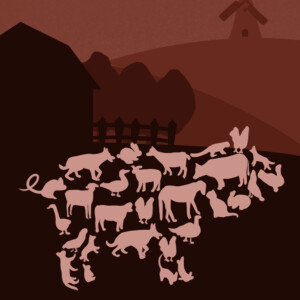
Tuesday Aug 15, 2023
Rebellion on Animal Farm: A Tale of Power and Corruption
Chapter 1:What is the book Animal Farm about
"Animal Farm" is a classic satirical novella written by George Orwell and published in 1945. It tells the story of a group of farm animals who rebel against their human farmer, Mr. Jones, with the aim of establishing an egalitarian society where all animals are equal.
The animals successfully overthrow Mr. Jones and take control of the farm, renaming it "Animal Farm." Initially, they create a set of commandments called the Seven Commandments, which emphasize equality and cooperation among animals. The pigs, led by Napoleon and Snowball, emerge as the dominant leaders, forming a hierarchy and gradually consolidating power over the other animals.
Over time, however, the principles of Animalism, the ideology that guides the revolution, become corrupted. The pigs manipulate the commandments to suit their own interests, engage in hypocrisy, and employ propaganda to maintain control. Eventually, the original ideals of equality and justice are abandoned, and the pigs effectively become the new ruling class, much like the humans they had initially revolted against.
The book serves as an allegory for the events leading up to and following the Russian Revolution of 1917. The characters represent various historical figures and groups, such as Joseph Stalin (Napoleon), Leon Trotsky (Snowball), and the working class masses. Through this allegorical tale, Orwell criticizes the abuse of power, totalitarianism, and the tendency of revolutions to devolve into tyrannical regimes.
"Animal Farm" serves as a cautionary tale about the dangers of authoritarianism and the importance of remaining vigilant to protect the principles of equality and democracy.
Chapter 2:Why was Animal Farm a controversial book
Political Criticism: Animal Farm satirizes the Russian Revolution and highlights the failures of communism. By portraying animals as political figures, Orwell criticizes the corruption, power struggles, and oppressive nature of authoritarian governments. This direct criticism of a powerful political ideology made it controversial, especially during the time when socialism and communism were gaining popularity.
Soviet Union Allegory: Although Orwell never explicitly mentions the Soviet Union or Stalin, it is clear that Animal Farm is an allegory for these entities. Many believed that Orwell's portrayal of the pigs as the ruling class and the other animals as the proletariat was a direct critique of Stalin and his totalitarian rule. Some found this allegory offensive and accused Orwell of being anti-communist.
Censorship and Suppression: Animal Farm faced censorship in certain countries due to its critical content. In fact, it was initially rejected by major publishers who feared offending the Soviet Union, an important ally during World War II. The fact that governments sought to suppress the book further highlighted its controversy.
Misinterpretation and Misrepresentation: Animal Farm has been misinterpreted and misrepresented over time. Some have mistakenly viewed it as solely an attack on communism as a whole, rather than a critique of totalitarianism. This misunderstanding has caused controversies and debates surrounding the true message of the book.
Overall, Animal Farm's controversial nature stems from its scathing critique of totalitarianism, its allegorical representation of the Soviet Union, and the political climate during which it was published. Its enduring relevance lies in its ability to provoke discussions on power, corruption, and the dangers of unchecked authority.
Chapter 3:What is the moral of the book Animal Farm
The moral of the book "Animal Farm" by George Orwell can be interpreted as a cautionary tale about the corrupting nature of power and the dangers of totalitarianism. The story reflects the events leading up to the Russian Revolution and the subsequent rise of Joseph Stalin's regime.
Through the depiction of animals overthrowing their human oppressors and establishing a system of animal equality, Orwell illustrates how even well-intentioned revolutions can be corrupted by those in power. The pigs, who initially advocate for equality and justice, gradually become tyrannical leaders, manipulating and exploiting the other animals for their own benefit.
The book warns against the concentration of power in the hands of a few, as it often leads to oppression and the erosion of individual freedoms. It emphasizes the importance of remaining vigilant, questioning authority, and not blindly following leaders without critical thinking.
Overall, the moral of "Animal Farm" serves as a reminder of the potential pitfalls of political ideologies and serves as a call for individuals to actively engage in maintaining and protecting democratic values.
No comments yet. Be the first to say something!